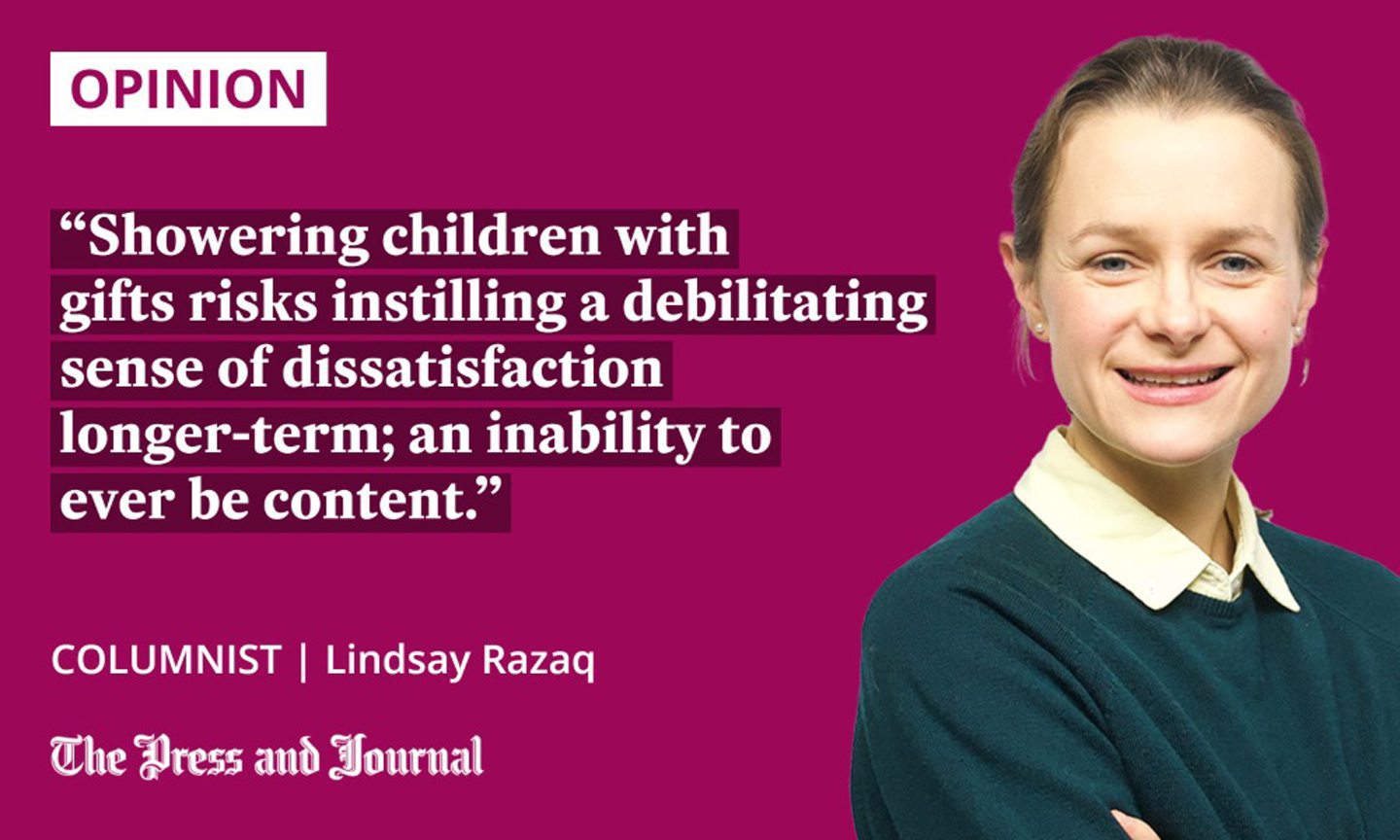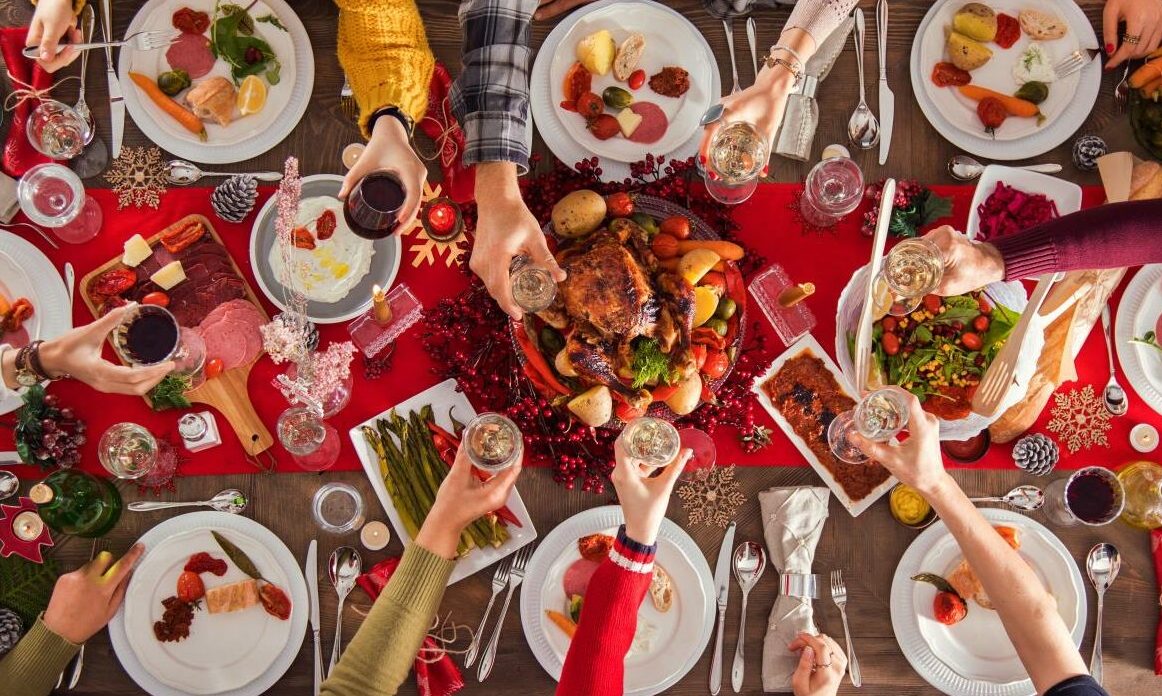We can (and should) make the festive season feel magical without overspending, writes Lindsay Razaq.
Our bedroom door opens and two bright eyes, very wide awake for the time of day, appear, inches from my face.
“Mummy, we need to see whether the reindeer have picked up our Santa letter!”
I sleepily tell my daughter, Maya, who’s five and extremely excited about Christmas, that we have to wait for her brother to get up, thinking that might secure a few more minutes under the cosy duvet.
Obviously, she interprets this as a cue to dash into his room, repeatedly shouting his name.
“OK, OK, we’ll go and look,” I mumble grumpily, while being dragged downstairs at breakneck speed.

Phew… Not only has the note gone, Father Christmas’s furry friends have given our sometimes-cheeky, sometimes-kind elves, Reddy and Hoho, a lift from the North Pole. Plus, there’s a tell-tale trail of snow from reindeer hooves.
Watching the children shriek with delight as they take in the scene is truly heartwarming – that is, until my eldest remarks how strange it is that the “Merry Christmas” sign left by Rudolph is identical to the one we traditionally hang on our front door. (Here’s hoping Mr Claus is clever enough to use different wrapping paper to mum…)
As usual, the self-satisfied “I’m nailing this parenthood thing” thrill is short-lived.
We all have a duty to celebrate responsibly
You’ve probably guessed by now that there’s much I cherish about this time of year – lights in windows, mince pies, carol-singing, and, above all, the anticipation of catch-ups with loved ones, so missed during Covid lockdowns.
But, I also worry we are losing our way when it comes to the modern festival – if, indeed, we haven’t already. Because, each year, we seem to be encouraged – as soon as Halloween is over – to go bigger and better, without any regard for the stress this inevitably causes, financial and otherwise.
Unsurprisingly, statistics suggest that the current cost of living crisis means this Christmas will be thriftier, with more families cutting back. For example, nearly half of those recently surveyed as part of Which?’s Consumer Insight Tracker said they intended to limit costs, with fewer presents and buying second-hand both cited as strategies for saving money.
And, of course, for people who are really struggling, December 25 will simply be another day to get through.
Guard against wasteful excess, be it planning meals so no food is thrown out, or setting budgets for presents
I feel strongly, therefore, in the context of such hardship and inequality that – as well as helping practically by supporting charities and foodbanks all year round (not just at Christmas) – we have a duty to celebrate responsibly. That is, to guard against wasteful excess, be it planning meals so no food is thrown out, or setting budgets for presents.
In fact, it wouldn’t do us any harm to take a more frugal, measured approach in the long run, either.
‘Fill up your heart’ instead
As a parent, it’s certainly a tricky balancing act. Clearly, I want my children, who won’t be little forever, to experience the so-called magic of Christmas. But, we must remember that this shouldn’t mean buying lots of expensive items.
As we saw first-hand after Maya’s birthday party, showering children with gifts makes it hard for them to appreciate any of them, or understand the value of things. It isn’t just unnecessary, it risks instilling a debilitating sense of dissatisfaction longer-term; an inability to ever be content.
At bedtime this week, we’ve been enjoying a wonderful book – The Whale Who Wanted More, by Rachel Bright and Jim Field – which captures this message beautifully.
Perpetually searching for the something he hasn’t yet got, Humphrey the whale finally learns (assisted by Crystal the crab) to stop collecting material objects and “fill up his heart” instead. “So perhaps true contentment is not about stuff,” it concludes. “Since we all need so little to have quite enough.”
It’s all about making memories
I regularly choke up when reading to the kids, often having to pause to regain my composure. But, even more than normal, I’ve been battling to get these last lines out recently. They’ve definitely struck a nerve.
Because, if I’m totally honest, since moving from our flat into a house, I have fallen into this exact trap of acquiring things we supposedly need, when, in reality, we absolutely do have “quite enough”.
Meanwhile, hundreds of millions of people around the world are desperately trying to make ends meet without even the “little” they do actually need.
So, as we enter the festive season, I will undoubtedly treat Maya and Kamran here and there. But, I’m also determined to keep Humphrey’s epiphany at the forefront of my mind, as a prompt to focus on what’s important.
For me, that means special moments together, which, looking back at my own childhood, is what I recall most.
I hope that by showing my small humans the merit of making time for each other, they too will gather similarly happy memories to build on.
Lindsay Razaq is a journalist and former P&J Westminster political correspondent who now combines freelance writing with being a mum




Conversation